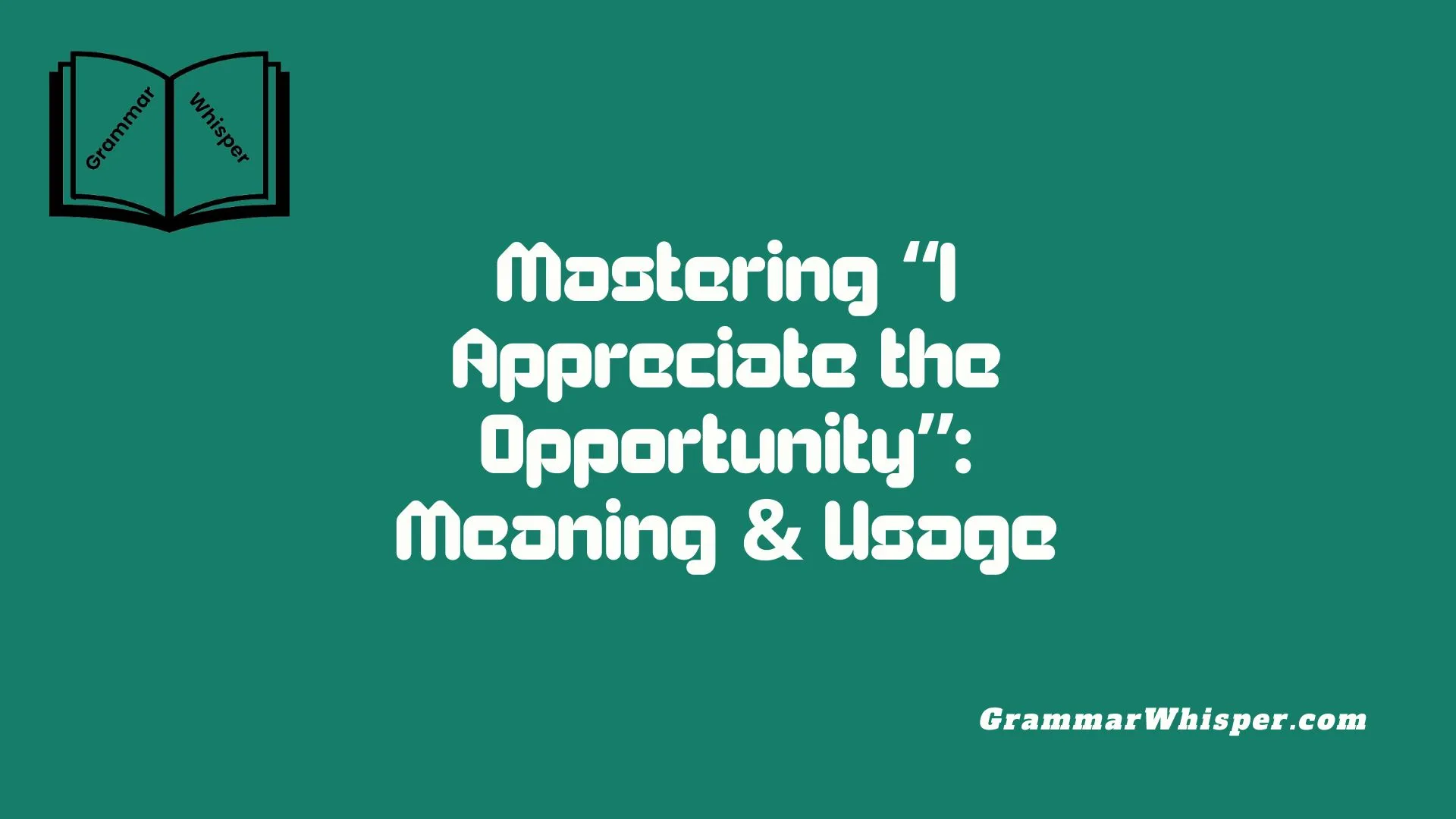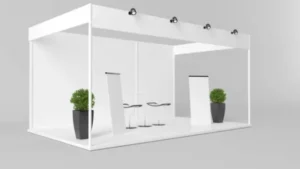In the fast-paced business world, the way you express gratitude can either make or break an important impression. Saying “I appreciate the opportunity” might seem like a simple phrase, but it’s a deeply powerful and professional tool. When used rightly, it sends a clear message of confidence, sincerity, and respect. However, if used wrongly or without thought, it can come across as common or hollow. That’s why proper usage of this expression matters so much. It helps you build authentic connections and leave a real impact where it counts most.
What’s worked for me is treating appreciation like a personal strategy – one that starts with understanding the psychology of expression. You need to know the definitions, avoid pitfalls, and use alternatives wisely. I often turn to helpful templates, study examples, and use a well-crafted guide when refining my tone. Each small choice helps deepen my approach and build stronger relationships. When done with care, your message feels meaningful and memorable. And in a world where everything moves fast, those thoughtful moments help your gratitude stand out even more.
Understanding “I Appreciate the Opportunity” in a Professional Context
What Does It Mean?
At face value, you’re saying “thank you.” But it goes deeper:
- Recognition: You acknowledge that someone valued your potential.
- Respect: You show gratitude for trust or confidence in your abilities.
- Connection: You express alignment with the mission or project offered.
Used well, this phrase reinforces relationships and underscores your professionalism.
When It’s Most Effective
Use this expression in real business scenarios:
- Job interviews – post-interview correspondence to reiterate enthusiasm.
- Project assignments – after receiving a new task or initiative.
- Leadership opportunities – when tapped for mentorship, public speaking, or committee service.
- Networking meetings – following professional introductions or informational interviews.
Real-world scenario:
“I appreciate the opportunity to present our findings to the board next Thursday.”
Here, it communicates readiness and gratitude without sounding overeager.
Avoiding Generic or Misplaced Gratitude
Some missteps weaken your message:
- Robotic overuse: “I appreciate the opportunity to assist our client…” Feels formulaic without context.
- Wrong timing: Saying it too frequently or prematurely dilutes impact.
- Inauthentic tone: Without warmth or personalization, it can come off as insincere.
Guidelines:
- Limit usage to key professional moments.
- Add context: why you appreciate it and what you’ll bring.
- Own your tone – be genuine, warm, and situationally mindful.
The Psychology Behind Professional Gratitude
Expressing appreciation triggers real effects:
- Positive reinforcement: You confirm and reward a colleague’s decision to involve you.
- Reciprocity: They’re more likely to offer future opportunities.
- Credibility boost: You come across as thoughtful, reflective, and confident.
Studies show that expressing gratitude in the workplace increases trust, job satisfaction, and collaboration by up to 50%.¹
Tone & Delivery: Making It Sound Genuine
To sound sincere, focus on:
1. Tone Matters
- Written form: Use contractions (“I’m grateful”) and conversational tone.
- Spoken form: Maintain eye contact and speak with calm confidence.
2. Pitfalls & Fixes
| Pitfall | Fix |
| “I truly appreciate the wonderful opportunity…” | Skip “truly” and “wonderful” – get straight to the point. |
| “I appreciate the opportunity. I’ll do my best.” | Combine: “Thanks for trusting me with this. I’ll give it my all.” |
3. Balancing Formality
- Job interview: Precise and polished.
- Internal project: Friendly yet professional.
- Peer networking: Warm and collegial.
Customizing Gratitude for Each Situation
In a Job Interview
Phrase:
“I appreciate the opportunity to discuss how my project management experience fits this role.”
- Shows preparation and relevance without desperation.
Upon Project Assignment
Phrase:
“Thanks for trusting me with this initiative. I’m excited to lead the planning phase.”
- Balances appreciation with confidence.
During Networking
Phrase:
“I appreciate the opportunity to connect. Your insights into product development were eye-opening.”
- Adds depth, and thanks for the intellectual contribution.
Alternatives to “I Appreciate the Opportunity”
Looking for variety? Here’s a helpful table of alternatives with tones and scenarios:
| Alternative Phrase | Best Used When | Tone |
| “I’m grateful for this chance.” | Formal interviews/project launches | Professional & polished |
| “Thanks for trusting me with this.” | Task delegation | Warm & confident |
| “This means a lot to me.” | Career milestones | Personal & heartfelt |
| “I value this opportunity.y” | High-stakes offers/promotions | Respectful & steady |
| “I appreciate you considering me.” | Networking/introductions | Humble & optimistic |
| “It’s a privilege to…” | Speaking engagements/committee roles | Ceremonial/ceremonious |
| “Thank you for the confidence.” | Promotions/new responsibilities | Appreciative & bold |
| “I’m honored to…” | Awards, board seats, mentorship | Humble & dignified |
Choosing wisely helps your message feel real, never generic.
How to Follow Up After Expressing Appreciation
Saying thanks is one thing – reinforcing it with actions is key.
After Saying Thanks
Action: Deliver strong performance.
Example: “Thanks for this assignment – my goal is to deliver the first draft within two weeks.”
Follow-Up Email Template – Job Interview
Subject: Follow-up: Appreciation for Considering Me
Email:
Hi [Name],
Thank you for the opportunity to interview for the [Position] role yesterday. I appreciated our conversation about X, Y, Z, and feel even more excited about the chance to contribute.
Please let me know if I can share any additional information.
Best, [Your Name]
Real-Life Examples & Templates
Scenario 1: Post-Interview Thank-You
Email “Hi Jessica, Thanks for the opportunity to interview for the marketing role today. I enjoyed learning about your social strategy, and I’m excited about the chance to bring my campaign analytics skills to the team. …”
Why it works
- Personal detail adds weight.
- Confident tone without fawning.
Scenario 2: After Client Onboarding
Message “Thanks for trusting us with your project. I appreciate the opportunity and will start by drafting the proposal this week.”
Why it works
- Sets expectations
- Shows readiness and appreciation
Scenario 3: Accepting a Promotion
Meeting Transcript (excerpt) “I appreciate the opportunity to step into this leadership role. I’m committed to supporting the team and driving results.”
Why it works
- Balanced humility
- Clear commitment
Common Mistakes to Avoid
- Overusing the phrase: Dilutes meaning with repetition.
- Being too vague: Avoid generic statements like “Thanks for everything.”
- Sounding rehearsed: Personalize your message to the person and occasion.
Case Study: Gratitude That Made a Difference
Background: A mid-level manager applied for a leadership program. After the interview, she sent a follow-up:
“Thank you for the opportunity to discuss my leadership potential. I appreciate the panel’s candid feedback on my team communication strategy. I look forward to implementing those insights.”
Outcome: She won the spot. Supervisors cited her gratitude, reflective tone, and specific reference to feedback as differentiators. It wasn’t just saying thanks – it was applying and reflecting on it.
Final Thoughts
In professional environments, words are more than just polite gestures – they’re tools that shape perception, build trust, and open doors. “I appreciate the opportunity” may seem like a simple phrase, but when used thoughtfully, it communicates respect, enthusiasm, and accountability. The key lies in how and when you say it.
Don’t let your appreciation sound mechanical. Instead, tailor it to the moment, back it with context, and follow through with action. Whether you’re thanking someone after a job interview, accepting a new role, or acknowledging a client’s trust, sincerity must shine through. And when you switch up your language using smart alternatives, your words feel more personal and less scripted – something that employers, colleagues, and clients all value.
Gratitude in the workplace is not about being nice – it’s about being aware, intentional, and strategic. When you express it authentically, you strengthen relationships, boost your professional image, and often leave a lasting impression that can translate into future opportunities.
FAQS:
What’s the best way to say “I appreciate the opportunity” without sounding repetitive?
Use specific alternatives that reflect the situation. Instead of repeating the phrase, try variations like “Thank you for considering me,” or “I’m grateful for the chance to contribute.” Customize your tone and context so your message feels fresh and authentic.
Can I use “I appreciate the opportunity” after being rejected for a job?
Yes, and it’s highly recommended. A simple note like “I appreciate the opportunity to interview with your team. I enjoyed learning about your company and hope to stay connected” shows professionalism and leaves the door open for future roles.
Is it okay to use this phrase in a casual business setting?
Absolutely, but adjust your tone. In casual settings, you might say, “Thanks for letting me take this on,” or “I value the chance to work on this.” Stay sincere, but keep it conversational and relaxed.
Does using this phrase make me sound overly formal or submissive?
Not if used correctly. It’s all about tone and placement. Expressing gratitude demonstrates emotional intelligence, not weakness. When combined with confidence (e.g., “Thanks for the opportunity – I’m excited to lead this project”), it positions you as both humble and capable.
What should I say instead when following up after a meeting or opportunity?
You can write: “Thank you again for your time today. I appreciate the opportunity to discuss ways I can contribute and am excited about the next steps.” This keeps the tone warm, forward-looking, and professional.











